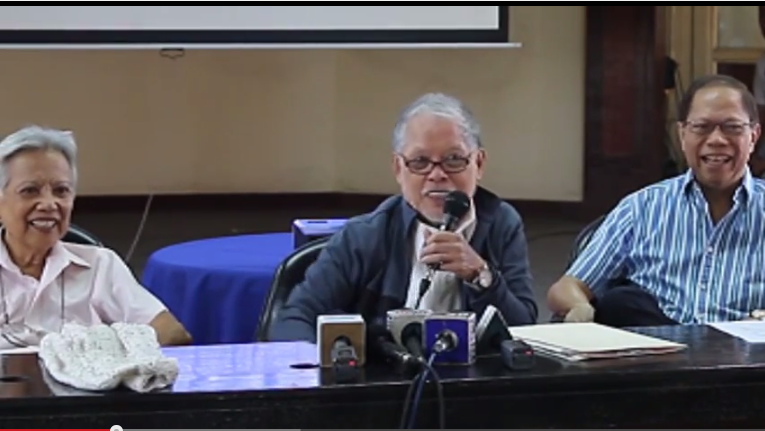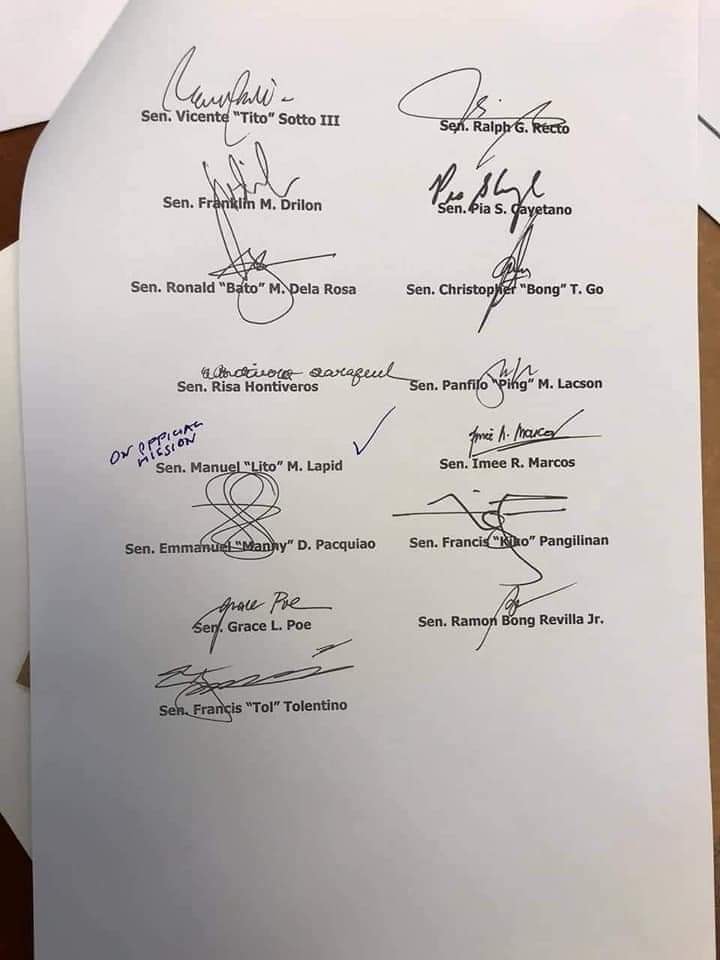Groups mourn passing of nationalist senator Rene Saguisag
Groups mourn the death of human rights lawyer Rene AV Saguisag, part of the “Magnificent 12” group of senators who voted against the extension of the US-Philippines Military Bases Agreement in September 1991.
A stalwart of the legal profession, Bagong Alyansang Makabayan (BAYAN) described Saguisag as a “Filipino patriot, staunch human rights lawyer and civil libertarian, indefatigable fighter for justice, nationalism and democracy.”
“We join the nation in giving thanks and paying tribute to Sen. Saguisag, an activist who never lost his bearings through the twists and turns of the people’s struggle. From taking the cudgels for human rights victims during the Marcos dictatorship, voting against the US Military Bases Agreement in the Senate, to opposing Gloria Macapagal Arroyo and Rodrigo Duterte’s fascist regimes, Sen. Saguisag’s long life of service to the nation and the people will always be cherished,” BAYAN said upon learning of Saguisag’s death on Wednesday, April 24.
Arrested due to his opposition to Ferdinand Marcos Sr.’s declaration of martial rule in 1972, Saguisag joined the Free Legal Assistance Group (FLAG) of Senators Jose Diokno and Lorenzo Tanada upon his release from prison.
He later co-founded the Movement of Attorneys for Brotherhood, Integrity and Nationalism, Inc. (MABINI) in 1980 with Tañada, future Senator Joker Arroyo, future Labor Secretary Augusto “Bobbit” Sanchez and future Vice President Jejomar Binay, among other civil libertarians.
After Marcos Sr.’s ouster in 1986, President Corazon Aquino appointed Saguisag her first presidential spokesperson who also encouraged his successful run for the Senate. Aquino reportedly referred to Saguisag as her possible successor to the presidency.
He however went against Aquino’s wish for an extension of the military bases agreement and honored his campaign promise to only become a one-term senator.

‘Magnificent until the end’
Fellow lawyers paid tribute to Saguisag, saying their colleague had been unswayed by power, “chasing away the darkness from Marcos Sr. to Marcos Jr.”
“We mourn alongside his children and family the loss of an indefatigable, incorruptible, and principled Filipino,” the group Concerned Lawyers for Civil Liberties (CLCL) said in a statement yesterday.
Saguisag co-founded CLCL in 2006 to help combat the spate of extra-judicial killings under President Gloria Macapagal-Arroyo and was a founding convenor of the Manananggol Laban sa Extra-judicial Killings, set up at the height of the killings and abuses under President Rodrigo Duterte.
It counts among its members Binay, Bayan Muna chairperson Neri Colmenares, former De la Salle University Law Dean Chel Diokno, Ateneo de Manila University Law Dean Antonio La Vina, former Quezon Rep. Erin Tanada, and other human rights lawyers.
CLCL pointed out that even in his advancing age and deteriorating health, Saguisag stood against the return of US troops through the Visiting Forces Agreement and the Enhanced Development Cooperation Agreement.
Saguisag also insisted in joining the petition against the Anti-Terror Act of 2020.
“Through the years, Sen. Rene with his signature wit and humor was a core of movements for free and impactful legal aid, for the rule of law, against disinformation and revisionism, and against all assaults on human rights,” CLCL said.
“Sen. Saguisag showed us how to recognize the insidious approach of anything dangerous or evil, and more importantly, how to slay it. He led by example, and there is no other way to honor his enduring legacy but to continue his work for the poor and the disenfranchised inside and outside the courtroom,” the group added.
But Saguisag once earned criticisms even from among his friends for pointing out the “unconstitutionality” of President Joseph Estrada’s ouster in 2001.
He however led investigations on the rigging of government contracts under Estrada who requested his participation in the probes. He also once described Estrada as a “substandard president.”
BAYAN said that even while Saguisag remained true to his legal profession, he remained their warm friend despite political and ideological differences in the pursuit for common aspirations such as people’s rights and welfare.
Despite old age and ailments, Saguisag also became an active convenor of the Movement Against Tyranny (MAT), the No to Cha-cha Coalition, and the Pilipinong Nagkakaisa Para sa Soberanya (P1NAS) that opposed China’s bogus claims over the West PH Sea as well as the US’ increasing role in stoking the PH-China conflict.
“May Sen. Saguisag’s life serve as a shining example and inspiration to our fellow Filipinos in their continuing struggle for freedom, justice, and democracy,” BAYAN said.
Bar topnotcher, top-notch journalist
Born in a poor family on August 14, 1939, in Mauban, Tayabas (now Quezon Province), Saguisag grew up in Pasig City where he graduated from Rizal High School (RHS) with honors. He was schoolmates and friends with the late Benito Tiamzon and Wilma Austria, reported top leaders of the Communist Party of the Philippines he described to Kodao as two of the brightest RHS alumni ever.
Saguisag earned a Bachelor of Arts degree from San Beda University in 1959, graduating cum laude while serving as editor-in-chief (EIC) of its college student publication The Bedan.
The Bedan eventually honored Saguisag by naming him as its EIC emeritus.
He earned his law degree from the same school in 1963 and placed sixth in the bar examinations of the same year. He went on to earn his Master of Laws from Harvard University as a scholar in 1968.
While building a successful career, he was invited to teach at his alma mater where he eventually became its law college’s assistant dean from 1971–1972.
It was while he was dean-in-charge that he recommended Duterte’s dismissal from the school for figuring in an in-campus shooting incident.
In the Senate, Saguisag was one of only two who lodged perfect attendance in all 415 session days from July 1987 to June 1990.
He co-authored the Code of Conduct and Ethical Standards for Public Officials and Employees (R.A. 6713) with his uncle and former Senate President Jovito Salonga and was the main author of the Ombudsman Act of 1989 (R.A. 6770).
After his Senate stint, Saguisag became a long-time columnist for The Manila Times and build a loyal following for his witty column “TGIF”. He also authored several books, notably “Saguisag Wit-1” and “Saguisag Wit-2.”
Saguisag was married to Dulce Quintans who later became Department of Social Work and Development secretary. They had five children.
Saguisag and wife figured in a vehicular accident on November 8, 1997 that killed Dulce and seriously injured the lawyer. # (Raymund B. Villanueva)




